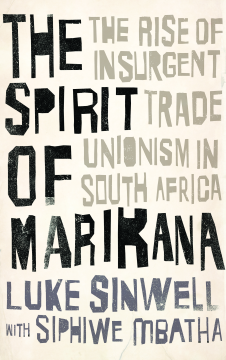
Additional Information
Book Details
Abstract
On 16th August 2012, thirty-four black mineworkers were gunned down by the police under the auspices of South Africa's African National Congress (ANC) in what has become known as the Marikana massacre. This attempt to drown independent working-class power in blood backfired and is now recognised as a turning point in the country's history.
The Spirit of Marikana tells the story of the uncelebrated leaders at the world's three largest platinum mining companies who survived the barrage of state violence, intimidation, torture and murder which was being perpetrated during this tumultuous period. What began as a discussion about wage increases between two workers in the changing rooms at one mine became a rallying cry for economic freedom and basic dignity.
This gripping ethnographic account is the first comprehensive study of this movement, revealing how seemingly ordinary people became heroic figures who transformed their workplace and their country.
'This book provides a fascinating and unique account of a set of pivotal events in recent South African history, as well as insight that is both locally and comparatively profound'
Dunbar Moodie, Professor of Sociology, Wits University
'The book provides what is currently missing - a detailed and sympathetic history, from within the ranks of the unions and workers committees and in the words of the strikers themselves'
Leo Zeilig, editor of Class Struggle and Resistance in Africa (2008)
'Highlights the crucial role of ordinary workers in changing history. It is a richly textured portrayal of the lives and activities of the grassroots worker leaders who organised the historic platinum strikes in South Africa. It is a path-breaking history of the labour movement and a scholarly tribute to the agency of the slain Marikana miners and their comrades'
Trevor Ngwane, South African socialist and anti-apartheid activist
'Exceptionally extraordinary'
CLR Journal
'Opens a window on the struggles of South Africa miners to overcome not only the opposition of the plutocratic mineowners, but also the opposition of the entrenched union establishment created in an earlier era of upheaval.'
Frances Fox Piven, City University of New York Graduate Center
'An incisive yet empathetic account'
African Studies Quarterly
Table of Contents
| Section Title | Page | Action | Price |
|---|---|---|---|
| Cover | Cover | ||
| Contents | v | ||
| Glossary of South African Organisations | vi | ||
| Acronyms and Abbreviations | xiii | ||
| Leaders | xv | ||
| Timeline of Key Events | xxi | ||
| Acknowledgements | xxvii | ||
| 1. Introduction | 1 | ||
| 2. The Spark Underground | 19 | ||
| 3. The Spirit of Marikana is Born | 38 | ||
| 4. Amplats Carries the Torch | 70 | ||
| 5. The Rise of the AMCU and the Demise of Worker Committees | 112 | ||
| 6. Insurgent Trade Unionism and the Great Strike of 2014 | 142 | ||
| Postscript | 163 | ||
| Appendix A: Interview Methodology | 167 | ||
| Appendix B: Workers' Secretary's Notes of a Meeting with Karee Management, 21 June 2012 | 170 | ||
| Appendix C: Memorandum from Khuseleka 1 and 2 to Management | 171 | ||
| Notes | 173 | ||
| Selected Bibliography | 195 | ||
| Index | 199 |
